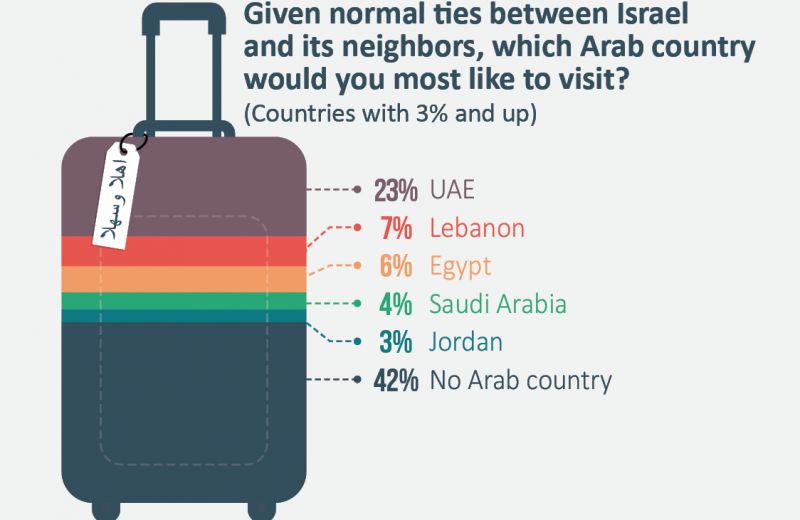 Op-eds
/ Israel and the Middle East
Op-eds
/ Israel and the Middle East
he details of the agreement that is being formulated between Israel and the United Arab Emirates, which gives a reason for hope for many, will soon be revealed. Admittedly, security, intelligence and economic cooperation is important. However, expanding and deepening civic cooperation between Israel and other Middle Eastern countries is equally significant. The key to that lies in the travel agreements between the countries, which would lead to opening Israel to tourists from the Middle East and North Africa region. Very few tourists from the Middle East visited Israel in past years for multiple reasons, including the boycott movements that ban any contact with Israel, the lack of the necessary financial means to travel and psychological barriers resulting from Israel’s image as an enemy. The fear of being seen in Israel’s embassies is another barrier. Most potential tourists would not want to risk being criticized for visiting Israel, nor would they want to risk having issues with the authorities.
As a part of the tourism industry, I often come across Jordanians, Egyptians, Moroccans, Iraqis and other nationals from the Middle East who express great interest in visiting Israel. Some contact me in person, and others through colleagues or mutual friends. In most cases, these are middle-class people who dream of visiting the holy sites of Islam in Israel or liberal, educated people who want to experience an encounter with the other – and sometimes both. Nevertheless, it seems that even when there is a will and the financial means necessary, there is a particularly stubborn barrier: the lack of reciprocity and the heavy bureaucracy involved in visiting Israel for tourists from the MENA region.
Israel calls this policy the “Countries under Consideration.” It is applied to nationals from Jordan, Egypt, Malaysia, Indonesia, Tunisia, Morocco, South Sudan, Mali and Mauritania. Iraq, Syria and Lebanon are still defined as enemy states, and their nationals are banned from visiting Israel. Nationals from these countries are subject to security checks before the tourist visa is granted. Meeting Israel’s security standards, even if the process is justified, is cumbersome and extends the application process by many months. Sometimes the application remains simply unanswered. In these cases, the excitement and interest of visa applicants from these “countries under consideration” who managed to overcome the initial barriers are replaced by despair and frustration. The gap between the need for security checks and the problematic way in which they are carried out requires rethinking.
Israel’s ties with most of the countries in the Middle East are largely based on security and economic interests, partially due to the ‘closed door’ that tourists from those countries face. This is the case, for example, with Jordan and Egypt, who have signed peace agreements with Israel. While the current security coordination between Israel and Egypt is currently at its highest level, the number of Egyptian tourists visiting Israel in 2018 was only about 6,200, some of whom are Coptic tourists who came on organized tours. The number of Egyptian tourists looks even smaller when it is compared to the 400,000 Israeli tourists who visited Egypt that same year, even though most likely traveled to peripheral Sinai, rather than to Cairo.
Although the number of Jordanian tourists was higher, it is far from reaching its true potential. A total of about 18,000 Jordanians visited Israel in 2018, some of whom were visiting their friends and relatives. Jordan also serves as a transit hub for tourists traveling from Israel to other Middle Eastern countries due to the presence of an Israeli embassy in Jordan. Muslim pilgrims from the MENA region visit Jordan on their way to Mecca and Medina and some participate in tours that visit the holy sites of Islam in Jerusalem. Jordan is also a transit hub for Arab and Palestinian citizens of Israel who travel to Mecca and Medina or for those who are seeking to obtain a visa for an organized trip to Lebanon. The sanctity of Jerusalem, which is a source of conflict in some areas, is a source of creative solutions when it comes to the tourism industry.
There are also tourists from countries in the region which do not have official diplomatic relations with Israel and Morocco is one of them. Israeli tourists were granted a special permit to visit Morocco since the 1980s. This became official in the 1990s while the Oslo process was underway. Despite the warm relations between the peoples, the number of Moroccan tourists who visited Israel in 2018 is still low, standing at about 3,000. In the absence of an Israeli representative office in Rabat, the bureaucratic process is long, expensive, and complicated, sometimes requiring travel outside of Morocco to obtain a tourist visa to Israel more than one time. In an attempt to help their Moroccan friends, some Israelis apply for a visa from the Interior Ministry in their lieu, but even then, there is no easy solution. The Israeli applicant is required to deposit between 10,000 and 30,000 NIS to the bank account of the Interior Ministry. The deposit is refunded only after the tourist leaves the country. An Israeli t
ravel agency that organizes trips from Morocco or one of the other “countries under consideration” to Israel is required to deposit 200,000 NIS in advance and is liable for the group visiting Israel throughout their stay in the country.
In contrast to the Israeli bureaucracy, Morocco shows flexibility, which makes it possible to leverage the deep cultural connection and bring about a consistent growth in the number of Israeli tourists who visit Morocco every year. As the former King of Morocco Hassan II put it, “when a Jew leaves Morocco, we do not lose a citizen, but gain an ambassador.”
**The article was published by Jpost on 2 October 2020.


